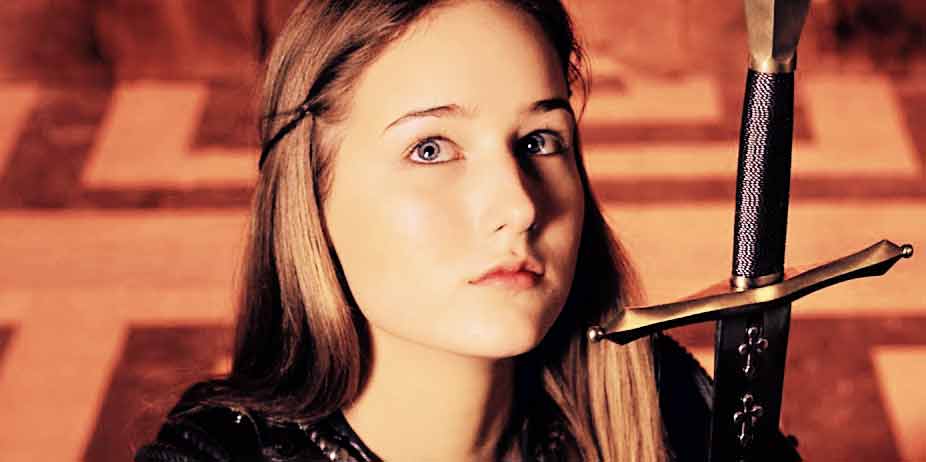Joan of Arc (1999)
Joan of Arc has always been an icon in history, a woman of great faith as she at only the age of seventeen went after what she believed to be God's will with heart and soul and lead France to its salvation from the tyrannical British rule of the 15th Century. The obvious fascination with her has turned out a number of films, the most impressive of these the television mini-series by Hallmark. In flaming letters on a black background we are introduced to the title of the film and heroine. As it fades away, replaced by a burning pier upon which she stands, lifting her eyes heavenward and whispering, "Thank you... thank you..." a shudder, perhaps a deeply felt faith, passes through us.
Joan of Arc is an unwanted child, born to a family of boys. Her father is a tyrannical, cruel man whose only interest is that of himself and his family. Fortunately her mother (Jacqueline Bisset) is fond of her, and Joan grows into young maturity befriended only by a blind child and the local prior, who sees in her an earnest desire to serve God. As the invading English burn and pillage the villages of France, making their way toward the capital and the home of the Dauphin Charles, Joan (Leelee Sobieski) is visited again by her patron saint Catherine and told that she will lead France to victory. Her way becomes clear after her village is burned and they are refused aid by the landowner, Sir Robert de Baudricourt, one of Charles' many pious land agents who seeks to fill his own stomach rather than serve his king. Robert's men are ordered to take a wagon of food as far as Orleans for the Prince's benefit. Abandoning her family, Joan conceals herself among the wares only to find that the wagon is bound instead for Robert's own kitchen. Taken in to see Sir Robert, Joan is mockingly given the title of "The Maid of Lorraine," the mythical female savior destined to save France spoken of by Merlin in myth. But even as Robert refuses to send her on to Charles, strange things begin happening in his city.
The men follow Jean's guidance without question, strengthening the walls of the city and building up defenses. Robert's chickens also refuse to lay eggs. In desperation, Robert sends her on to Charles with a letter of recommendation... and his chickens begin to lay again. Joan is welcomed by Prince Charles, who finds her something of a commodity, a way to give the people vision; but an advocate against her comes in the form of Charles "spiritual advisor," Bishop Cauchon (Peter O'Toole), who does not believe that a mere girl has the right to determine the fate of France. Yet even he cannot deny the power that radiates from Joan, even as he struggles with his own personal beliefs. Charles has appointed Joan as the head of his armies, but his military advisor gives her a backseat. She's there to cheer the troops on, lead the charge, and "try not to get killed."
But Joan is no pushover... and it will be she that will raise a cry against all of England and frame the powerful woman who has become a legend in her own right. Treachery lies in the eyes of someone within the Prince's confidence... and even Charles himself will betray her, though all will regret what they have done as the girl is granted entrance to heaven through the burning pier. But before her lies a great many battles to be fought, a great many people to touch and the faith that inspired France to its victory. Part history, part myth, with a little bit of imagination, this epic miniseries is a masterpiece in its attempt to bring Joan to life in living color... in a way you've never seen her before. Joan of Arc is quite impressive and while not following history exactly it does its best to portray the life of the young woman with clarity and passion, the praise of which belongs solely to the lead actress, Leelee Sobieski. She has the "look" of Joan of Arc... innocence mixed with wisdom, passion intertwined with fear. A strict Catholic, her belief in God is strong and her faith in the words spoken to her by the "saints" ideally strengthened.
Forced to evaluate her motives at one point, she repents of the sin of pride. Some may shun this film for its devout Middle Ages Catholicism but Joan of Arc was Catholic, and the Church in those days was often corrupted by crooked politicians within the church system. You are drawn into the story early on and kept pinned there throughout the full several hours. The characters all have their own amount of depth, Joan most critically, secondly the spineless and self-centered Dauphin who would betray her, and thirdly the Bishop (Peter O'Toole) who realizes too late that Joan's faith is in the right and questions his own in sending this innocent and trusting girl to an early grave. From the first glimpse into the eyes of Joan to the last moment as she looks heavenward we've been taught a lesson about faith, courage and treachery that we won't soon forget.
Sexual Content:
There's a vague implication of rape. (The Bishop sends a soldier down to the imprisoned Joan and we hear her screaming.)
Language:
None noted.
Violence:
The battle sequences and death count are high, and while no language is apparent, the violence is enough with arrows, swords, and blood. Joan is brought down by an arrow and shows incredible strength in demanding that the tip be broken off before she pulls it out herself.
Other:
None.

